Integrative Medicine
Innovative medicine is transforming healthcare by combining the top elements of conventional healthcare with effective complementary treatments that are supported by evidence.

Integrative medicine heals the whole man or woman, repairing both body and psyche in an ideal way that renders a sustainable health advantage. This practice combines the best of conventional medical treatments with complementary methods of treating patients through acupuncture, nutrition, and mindfulness, among others.
In this blog, we explore the many healing benefits of integrative medicine, how it supports wellness, and who can benefit from this holistic approach to care.
What are the healing benefits of integrative medicine?
Integrative medicine provides healing benefits by addressing the whole person—mind, body, and spirit. It promotes overall well-being through a combination of traditional and alternative therapies.
It stresses a personalized approach to health where the patient benefits from natural healing therapies along with conventional treatments. It helps reduce stress, chronic pain, and mental illness. It also speaks of prevention, helping a patient lead an active lifestyle by diet, exercise, and other mindfulness practices. Ideally, by treating both the symptoms and causes of any illness, it creates longevity in healing, thus helping balance and offers vitality in all walks of life.

How does integrative medicine enhance overall wellness?
Integrative medicine enhances overall wellness by promoting balance between physical, emotional, and mental health. It combines natural therapies with traditional medical care to create a comprehensive treatment plan.
Above all, integrative medicine is based on wellness, eating healthy, exercise regularly, and stress control. The tools used include meditation, yoga, or acupuncture to minimize the aspects of stress as well as to heal emotionally.
Moreover, nutrition and herbal therapies help support and maintain body natural healing processes. Patients are taken through such holistic health practices to be more vigorous and healthy for a better quality of both physical and mental health. The objective has changed from a cure for illness to a state of continued wellness.
What role does integrative medicine play in chronic disease management?
Integrative medicine plays a crucial role in chronic disease management by combining conventional treatments with complementary therapies to address the root causes of disease. This approach improves both symptom relief and long-term health.
It helps in working together with traditional care to give patients with chronic conditions, such as diabetes or arthritis, a holistic approach. Methods that may help control pain, minimize inflammation, and boost energy levels include acupuncture, massage, and nutritional counseling.
Other than body treatment, the reduction of stress and mental wellness practices add up to better management of chronic disease. This is, therefore, what integrative medicine essentially aims to do: treat the whole person and assist him or her to take charge of their health while improving their quality of life.

Who can benefit from integrative medicine?
Integrative medicine benefits people of all ages and health conditions, especially those seeking holistic and personalized care. It is especially useful for managing chronic conditions, stress, and mental health issues.
Integrative medicine is more suited for those who would like a holistic approach to therapies, both conventional and natural, since it heals their health. Those suffering from chronic pain, fatigue, anxiety, or other chronic conditions may find these helpful as they design an individual care plan that cares for the mind, body, and spirit.
Others are those seeking prevention of sickness and enhancing general condition through lifestyles. Because it benefits children, adults, and seniors, the approach has a broad appeal from one end of the age spectrum to the other.
How does integrative medicine combine traditional and alternative therapies?
Integrative medicine combines traditional and alternative therapies by merging evidence-based medical treatments with holistic approaches. This blend creates a comprehensive care plan for both prevention and healing.
In operation, means such as surgery or pharmaceuticals have been combined with complementary techniques, such as acupuncture, herbal medicine, and yoga. For example, it might combine a physical therapy program for a post-surgical patient with stress-reducing techniques, such as meditation.
Holistic health practitioners and caregivers frequently incorporate alternative therapies to aid their clients in the recuperative process, whereas conventional remedies treat what is ailing them. Such an approach enables patients to experience the benefits of both worlds: maximum healing processes and, hopefully, lasting recovery.
Conclusion
Integrative medicine works well because holistic healthcare treatment is aligned on the lines of traditional medical treatments and holistic therapies. Its personalized and comprehensive approach makes it an effective curative for wide-ranging conditions—chronic illnesses, mental health challenges, and so much more. In fact, attending to the whole person fosters long-term healing and a sense of overall wellness. Whether managing a chronic condition or looking to improve wellness, millions of people stand to benefit from such a balanced approach to health care.
Integrative Medicine
Innovative medicine is transforming healthcare by combining the top elements of conventional healthcare with effective complementary treatments that are supported by evidence.

Bring together the best of both conventional medicine and natural health remedies so as to achieve Healing that is wholesome. It’s a system that emphasizes treating an individual as a whole i.e. the mind, body, and spirit of the individual in question. Different techniques of evidence-based holistic health care combine to build up wellness. In this way the use of this area of wellness treatments opens up possibilities of lasting health incorporating the use of complementary and alternative medicine.
This blog will explain some important aspects of integrative medicine and how patients are able to learn to use this approach to improve their health.
What are the core concepts of integrative medicine?
The core concepts of integrative medicine emphasize whole-person care, personalized treatment, and the combination of conventional and alternative therapies. This approach aims to improve overall wellness rather than just addressing symptoms.
It entails treating the whole patient; Physical health as well as mental and emotional health and development are contained under the treatment plan. Think of including prevention and changes in the way of life, for instance, changes in diet and exercising and coping methods for stress within the treatment plans.
Using integrative medicine, it becomes possible to deliver such personalized treatment. The synergistic effect of the integration of both orthodox and alternate medicine could not only provide symptomatic relief but also support the treatment of cancer in its true sense – to promote healthy living rather than purely symptom management.

How do integrative medicine techniques promote holistic health care?
Integrative medicine techniques promote holistic health care by addressing physical, emotional, and mental well-being. These methods include a blend of conventional medical practices and natural healing approaches like acupuncture and herbal medicine.
Holistic health practitioners utilize a variety of methods in integrative medicine, including mindfulness, nutrition counseling, and energy-based therapies like Reiki. In this dimension, it would ensure that the cause and origin of a patient’s condition were diagnosed and not merely the symptoms.
Techniques such as stress reduction, exercise regimens, and detoxification all support general health. Combining these methods with conventional treatments allows for a comprehensive care plan, thereby making holistic health care more effective and tailored to the individual’s path toward wellness.
What role do natural health remedies play in integrative medicine?
Natural health remedies play a crucial role in integrative medicine by complementing traditional treatments and offering non-invasive healing options. These remedies help restore balance and promote wellness naturally.
Natural remedies, including herbal supplements, essential oils, and homeopathy, are often used in addition to conventional treatments to compliment the healing process. These remedies often heal at the very root of the illness by promoting balance in body systems.
Such treatments may include dietary changes, mindfulness techniques, or detox regimens. Natural health remedies combined with conventional care deliver a less-intrusive and holistic approach toward well-being. Such a way of working is in agreement with the philosophy of complementary and alternative medicine about the treatment of the whole person.
How do holistic health practitioners apply integrative wellness treatments?
Holistic health practitioners apply integrative wellness treatments by using a patient-centered approach that blends conventional medical care with natural therapies. These treatments focus on restoring balance in mind, body, and spirit.
The holistic health practitioners integrate acupuncture, massage therapy, nutritional counseling as well as mindfulness exercises in their treatment plans. They attend to the patient’s physical as well as mental needs.
Therefore, each of them makes specific care strategies directed towards attending to their health condition. However, for these programs they combine post-surgical recovery with the standard recovery processes using medications or surgeries, this process more holistic recovery. The intent is to remedy the underlying problem of health deficiencies and whilst doing so remedy the individual with integrative health solutions that will generate enduring stability and vitality.

What are the benefits of combining complementary and alternative medicine with conventional care?
Combining complementary and alternative medicine with conventional care provides a more comprehensive approach to treatment. It helps address the root causes of illness while improving overall well-being.
Integrating complementary and alternative medicine with conventional care allows patients to derive the benefits of two worlds. A potential reduction in side effects, speeding up recovery, and seeking more natural ways of handling chronic diseases is assured.
Acupuncture and herbal medication are claimed to augment the efficacy of interventions such as surgery or medication, which may be embraced in the best possible way to enhance positive health outcomes. This was praised due to the support of holistic health care in which healing in the three domains of; body, emotions and mind all positively impact on health. Hence patient’s recovery process is more effective and personal.
Conclusion
Integrative medicine bridges the divide between orthodox medicine and alternative medicine, which leads to a more complete patient healing approach. Patients are offered a total solution that guarantees satisfaction of their physical, psychological, and emotional needs by integrating both alternative and orthodox medicine. In this case, the practitioners are able to use integrative healing measures to come up with individualized effective well-being plans that are long-term. This advances the quest for the total health of the body, mind, and spirit.
Integrative Medicine
Innovative medicine is transforming healthcare by combining the top elements of conventional healthcare with effective complementary treatments that are supported by evidence.

Integrative medicine encompasses the appropriate elements from conventional, complementary and alternative healing modalities which can be traced to traditional medicine. As it has developed over the ages, it has incorporated some technological advancements in addition to the existing holistic ideas which look at the body, mind, and spirit. This way of doing things aims at restoring the correct distribution of energy by way of combining conventional and natural treatments for complete patients’ recovery.
In this case, we will discuss the historical development, present state and particular features of integrative medicine, and in what ways this practice improves the relationship between body and mind.
What is the historical origin of integrative medicine?
Integrative medicine originates from ancient healing systems like Traditional Chinese Medicine and Ayurveda. These systems focused on treating the whole person through natural healing therapies and balance.
A brief history of the development of the integrative medicine arises more than a thousand years ago. There was Ayurveda for instance that developed the inter relatedness of mind, body and spirit which was at the very centre of the intergrative.
Herbal medicine further included acupuncture and energy medicine and such is Traditional Chinese Medicine. Over the years such principles fused with more conventional medicine practice and in most cases created a wider scope. Integrative medicine in the present day is how people combine the old ways with the new ways of medicine to improve health.
How has integrative medicine evolved over time?
Integrative medicine has evolved by combining ancient holistic practices with modern medical science. This approach embraces complementary medicine to offer a well-rounded treatment method for patients.
Integrative medicine has evolved over the years not only in terms of inclusion of evidence-based practices from both Western and Eastern medicines but also necessarily demanded a shift in the direction of mind-body wellness healing. Healing was no longer restricted to the confines of manifest physical symptoms. It extended beyond that, embracing other emotional and mental health aspects as well.
Now, integrative health practices encompass acupuncture, mindfulness, nutrition, and natural therapies. This would have come about because of the need and growth for such treatments and the fact that traditional medical remedies were incapable of addressing the entire human being.

What are the core principles of integrative health practices?
The core principles of integrative health practices focus on treating the whole person—mind, body, and spirit. These principles emphasize prevention, personalized care, and the combination of natural and conventional treatments.
Despite the unique approach of integrative medicine that does not align with conventional medicine, it may be noted that healing transcends the physical boundaries to the spiritual and mental facets as well. These forms of such therapy include moxibustion, acupuncture, and treatment with herbal ingredients as well as practices like meditation, serving rather than contradicting the traditional medical practice.
True health has to do with stopping illness from starting in the first place and promoting overall wellness, where the potential for illnesses is viewed as a form of an aggravation. A one size fits all approach is non-existent considering that the process of restoration to health differs from one individual to the other. Support for complementary medicine encompasses such an integrative health care system.
How does integrative medicine incorporate holistic health care?
Integrative medicine incorporates holistic health care by blending natural healing therapies and traditional treatments. This approach focuses on treating the entire person rather than just specific symptoms.
Holistic health care in integrative medicine seeks to integrate best practices from a multi-modality of healing. The patient gets treated with the mind-body wellness interventions in focus on the emotional, mental, and physical. Examples of holistic remedies include yoga, meditation, acupuncture, and naturopathy.
These therapies are in conjunction with the conventional treatment, such as surgery or medication, in designing a wide-ranging and multi-faceted treatment plan. These holistic medicine benefits are characterized by more personalized and effective healing experiences.

What role do natural healing therapies play in integrative medicine?
Natural healing therapies play a crucial role in integrative medicine by offering non-invasive, complementary treatments to conventional medical practices. These therapies support mind-body wellness and overall balance.
To encompass self-care for chronic illness as well as wellness, herbal medicine and acupuncture, energy healing, and ayurveda and detox are common in traditional health systems as well as allopathic medicine. These therapy approaches supplement and enhance the understanding of what causes ailments, how to aver them, and promote overall health. Integrative therapies enhance conventional medicine, which, in return, helps to reduce the severity of drug side effects and length of recovery time.
Natural remedies also enable patients to enjoy full benefits of therapy including the healing of emotions and spirit as opposed to material infectious disease therapy only.
In Conclusion
It is worth noting the history of integrative medicine – it is the fusion of some ancient traditional knowledge associated with healing some modern scientific medicine. It promotes a comprehensive approach to health by combining αλλε λέϊκο ζωγραφι, and practices of alternative medicine. As such practices evolve Facilitating this movement, the thrust on integration of medicine is at the center of improving health and wellbeing of the society.
Integrative Medicine
Innovative medicine is transforming healthcare by combining the top elements of conventional healthcare with effective complementary treatments that are supported by evidence.

The healthcare arena has changed considerably in recent years with the rise of new methods that have been developed to address human health intricacies. Among such approaches are integrative and functional medicine which have become popular. Although they both adopt a similar holistic approach to healthcare, they differ philosophically, operationally as well as in application.
What Is Integrative Medicine?
Integrative medicine combines conventional medical treatments with complementary therapies, focusing on holistic care to address physical, emotional, and spiritual well-being for overall health.
Integrative medicine includes conventional Western medicine alongside complementary and alternative therapies. Instead of focusing on specific symptoms or diseases, this model ensures that patients are viewed holistically.
Integrative medicine focuses on the needs of the patient during the treatment process. Every individual requires personalized attention based on their specific issues, needs, requirements, or situations.
In its quest for wellness, this approach looks at every aspect in a person’s life including physical, emotional, mental, social and spiritual aspects.
Although it allows alternative therapies into its system of operation; this concept underscores evidence-based treatments. It attempts synthesizing conventional treatment with proven complementary therapy.
In many cases, it involves teamwork of doctors with other specialists like nutritionists and acupuncturists for comprehensive health services.
What Is Functional Medicine?
Functional medicine seeks to identify and address the root causes of disease by focusing on individual genetics, environment, and lifestyle, aiming for personalized, holistic treatment.
Functional medicine is a biological approach that focuses on the identification and elimination of root causes of ailments.
Instead of just treating symptoms, functional medicine seeks to discover the underlying causes of illness. It recognizes that one condition may have many causes.
This approach acknowledges that each person has unique genetic, biochemical, and lifestyle factors that influence their health. Such individual characteristics are used for formulating treatment regimens.
Like integrative medicine, functional medicine puts the patient at the center of care. However, it goes further in its emphasis on understanding the patient’s detailed personal and family history.
The golden thread running through this medical system recognizes that an organism is a single whole.
How Is Functional Medicine Put into Practice?
Functional medicine is practiced through comprehensive assessments, personalized treatment plans, and lifestyle interventions, addressing root causes of health issues rather than just symptoms.
In practice, functional medicine practitioners usually have a comprehensive approach.
This takes into consideration more than just medical history. This medicine also considers factors such as diet, lifestyle, environmental exposures, and emotional well-being.
It uses specialized tests to understand the nutritional status of a person, metabolic function and genetic factors.
Practitioners might include targeted nutritional therapies, lifestyle modifications, stress management techniques and sometimes prescription medications.
Functional medicine gives importance to gut health for overall wellness. This is an approach whereby nutrition and environmental factors interact with an individual’s genetic makeup.
What Are The Major Differences between Integrative and Functional Medicine?
Integrative medicine blends conventional and complementary therapies, while functional medicine focuses on personalized, root-cause treatments through lifestyle and environmental factors for holistic health.
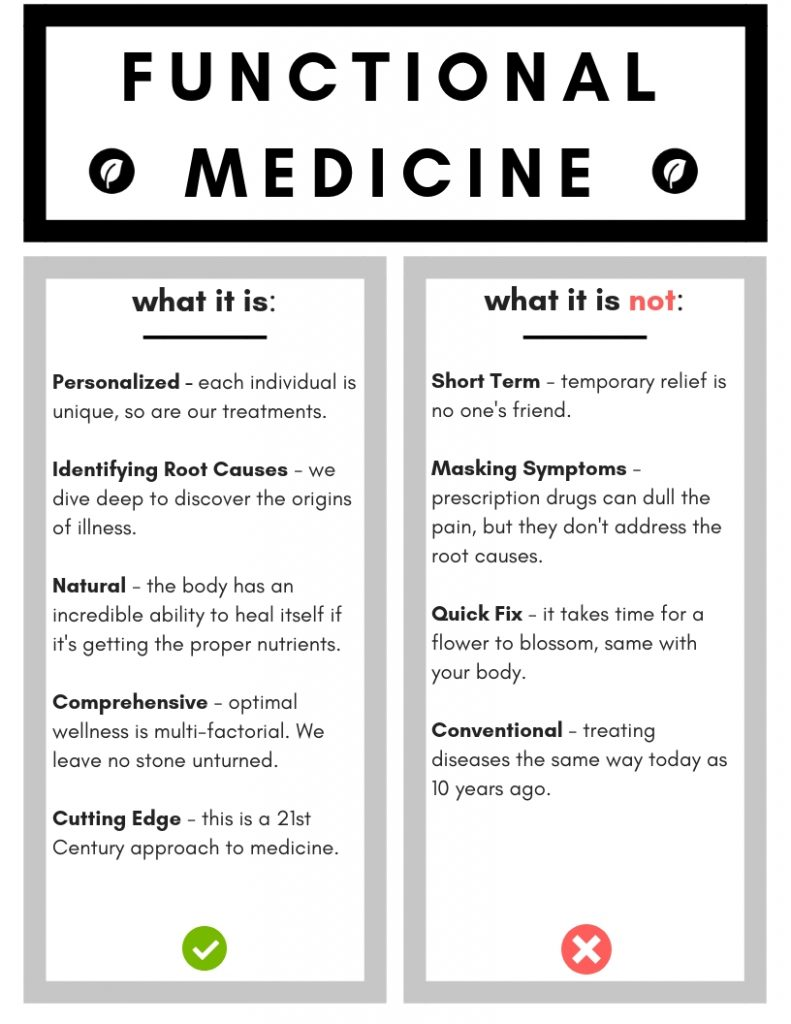
Integrative Medicine brings together conventional and complementary approaches with a focus on healing the whole being. Diagnostic methods can be traditional or conventional.
Functional Medicine Primarily it emphasizes on finding root causes of chronic diseases through advanced diagnostic tools and targeted interventions. To uncover underlying imbalances/dysfunctions, advanced laboratory testing is used alongside detailed patient histories.
Integrative Medicine combines varied healing modalities, both conventional and non-conventional methods, which are emphasized by integrative medicine. A combination of conventional medical treatments and alternative therapies are used in integrative medicine practices.
Integrative medicine is frequently practiced by conventional doctors who have been trained conventionally but have also received training in complementary therapies.
Personalized systems-oriented interventions are used to address the root cause of diseases in functional medicine. It may incorporate conventional treatments if necessary but prefers addressing underlying imbalances first.
This can be carried out by different types of healthcare professionals, such as MDs, DOs, and naturopaths who have undergone training in specific areas of functional medicine.
What Is The Importance of Patient Engagement?
Patient engagement is crucial in functional and integrative medicine as it fosters active participation in care, enhances adherence to treatment plans, and improves overall health outcomes.
Integrative Medicine encourages patients to be more involved with their own healing journey rather than being passive recipients of treatment. This form of medicine requires less time commitment from physicians and patients alike.
Poorly implemented wellness plans in functional medicine may require the patients to adopt significant lifestyle changes. This may lead to extended interviews involving long hours of consultation and repeated monitoring.
How To Choose Between Integrative and Functional Medicine?
Choose based on your needs: Integrative medicine blends conventional and complementary approaches, while functional medicine focuses on root causes and personalized treatments.
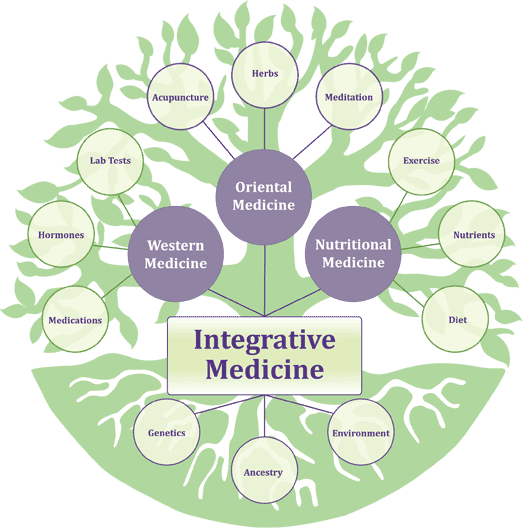
Sometimes, the choice between integrative medicine and functional medicine depends on individual health preferences, needs, or goals. People looking for a blend of conventional and alternative approaches might prefer integrative medicine, while those suffering from complex chronic conditions that necessitate delving into root causes may choose functional medicine.
It is important to note that these approaches are not mutually exclusive. Many practitioners use both integrative and functional medical models in their practice as per each individual patient’s needs.
Is integrative medicine covered by Medicare?
Medicare generally does not cover integrative medicine treatments like acupuncture or nutritional counseling, but it may cover some services if they are part of conventional medical care.
Medicare generally neglects the use of integrative medicine. The focus is largely on evidence-based conventional treatments that are medically necessary. However, there are some services like acupuncture provided for chronic lower back pain which can be covered under certain circumstances but many inclusive therapies like homeopathy, naturopathy and other holistic treatments are typically excluded.
What is the downside of functional medicine?
The downsides of functional medicine can include higher costs, limited insurance coverage, and a potential lack of robust scientific evidence for some treatments and approaches.
Functional medicine’s downsides include high costs because it requires excessive examination and services that insurers do not cover. It might also lack strong scientific proof concerning some techniques, which has contributed to skepticism among medical professionals. Furthermore, it is impractical for some patients.
Are functional doctors worth the money?
Functional doctors may be worth the money for those seeking personalized, root-cause treatment and holistic care. However, it depends on individual health needs, preferences, and financial situation.
For individuals who are not getting results from traditional medicine but are willing to pay for a custom-made approach to wellness, functional doctors can be worthwhile. Nevertheless, inconsistent outcomes and no insurance coverage necessitate a careful consideration of the benefits of this treatment.
Conclusion
Both integrative and functional medicine have useful approaches to healthcare that emphasize individualized care for patients. Integrative medicine focuses on combining conventional and alternative therapies, while functional medicine delves deeply into root causes using advanced diagnostics.
Knowing these dissimilarities may enable individuals on their health journey to make informed choices that could lead to more comprehensive and effective treatment results.
Reference
Integrative Medicine
Innovative medicine is transforming healthcare by combining the top elements of conventional healthcare with effective complementary treatments that are supported by evidence.

When taking care of health, it is important to understand the differences between Holistic and Integrative medicine. Thus, this work undertakes to examine how such concepts vary from one another with regard to their underlying principles, practices, and place in modern healthcare provision.
What is Holistic Medicine?
Holistic medicine is an approach to healthcare that considers the whole person—mind, body, and spirit—in the prevention and treatment of disease. It emphasizes the connection between physical, emotional, and spiritual well-being to promote overall health.
It is different from conventional methods that only deal with certain symptoms of diseases because holistic medicine adopts an all-encompassing approach towards a person. It essentially understands that human life has physicality, psychology, spiritual nature, and much more that contribute to one’s welfare. Most times this includes self-care and preventative services where individuals are encouraged to take control of their own health.
There are several different balance-promoting healing therapies found in holistic medical practices. These include acupuncture which involves pricking thin needles at specified points so as to trigger the body’s natural processes aimed at healing. Massage therapy employs physical manipulation techniques to relieve tension and bring about relaxation. Herbology utilizes plant-based substances for improved health or treatment of various maladies.
Holistic medicine blends these approaches together in an attempt to provide a more complete and personalized care model.
What is Integrative Medicine?
Integrative medicine combines conventional medical treatments with alternative therapies to treat the whole person. This approach aims to enhance well-being by integrating practices like acupuncture, herbal medicine, and nutrition with standard medical care.
Integrative medicine is the most recent alternative method that combines traditional Western medical utilities with non-conventional treatments. It advocates for evidence-based services that blend scientific modalities with those of a traditional nature for both physical as well as emotional wellness. The main objective here is to make use of the best features from both sides – conventional/alternative.
In integrative medicine, there have been common instances when regular treatments like drugs or surgery are combined with other forms of complementary care such as acupuncture massage therapy, or nutritional counseling. This idea has gained recognition within mainstream healthcare because it places emphasis on patient-centered care thereby giving comprehensive approaches based on the rationale- a generalist perspective of human beings’ condition.
They will work closely with their patients and other clinicians to design tailored treatments that target the underlying causes, but they will also consider personal welfare.

Holistic vs. integrative medicine: What makes them different?
Holistic medicine focuses on treating the whole person, considering mental, emotional, and spiritual factors, while integrative medicine combines conventional and alternative therapies. Both aim to promote overall well-being but differ in their methodologies and treatment approaches.
While there are similarities between holistic medicine and integrative medicine, they differ in many aspects. It is based on the philosophy of treating the entire person before opting for complementary interventions. This promotes prevention, self-care, and the unity of body, soul/mind, and spirituality. Holistic practices tend to be more about natural or alternative forms of treatment.
On the other hand, integrative medicine links conventional therapies used by physicians with other complementary therapies. It is based on evidence-based practice that allows for the incorporation of proven scientific approaches into established modes of care. This approach has now become a norm adopted by many leading hospitals working across departments.
Does Naturopathy Equate with Integrative Medicine?
Naturopathy and integrative medicine share a focus on natural healing and overall wellness. However, naturopathy primarily uses natural remedies, while integrative medicine combines conventional medical treatments with complementary therapies for a broader approach to health.
Nevertheless, naturopathy should not be confused with integrative medicine though they have some similarities. This type of alternative medical system stresses on use of natural means while recognizing human’s inherent ability to heal itself. The method supports such modalities as phytotherapy, dietotherapy and balneology for maintaining well-being.
However, standard medical treatments including those from naturopathic methods are often fused into integrative medicine. However, typical naturopathic remedies concentrate on improving all-rounded wellness issues like mental health while both evidence-based conventional aspects and non-conventional ones are acknowledged in integrated medicine.
Thus, this would mean adopting an inclusive approach entails using traditional drugs rather than those derived from naturopathy.
Is Integrative Medicine a Specialty in the Medical Profession?
Integrative medicine is recognized as a specialty within the medical profession, focusing on combining traditional treatments with complementary therapies. Practitioners often have specialized training in both conventional and alternative medicine to provide comprehensive patient care.
This new allied health discipline; called integrative medicine has bright prospects because of its patient-centric focus and evidence-based approaches. In an attempt to increase the credibility of integrative medicine in national healthcare systems, some efforts have been made toward formal certifications and training.

What is Another Term for Integrative Medicine?
Another term for integrative medicine is complementary and alternative medicine (CAM). This approach combines conventional medical treatments with alternative therapies to promote overall well-being and address the physical, emotional, and spiritual aspects of health.
Although these terms relate, they carry distinct connotations. Complementary medicine actually describes healing therapies that are combined with conventional treatments.
Functional medicine’s goal remains the identification of root causes of disease and personalized treatment plans. Holistic medicine, on its part, aims at a comprehensive health approach similar to integrative but often more focused on alternative therapies.
How can you integrate holistic and integrative practices into your life?
To integrate holistic and integrative practices into your life, incorporate activities like meditation, yoga, and balanced nutrition. Consult healthcare professionals to combine these practices with conventional treatments for a personalized approach to overall wellness.
These activities will improve both mental and physical health resulting in a balanced lifestyle. Furthermore, one should also consider adding complementary therapies like acupuncture or massage therapy to address particular health issues and promote relaxation.
Balancing conventional and complementary therapies involves coordinating your treatment plans to ensure they work harmoniously. If for example you are under conventional medical treatments such as medication or surgery, consult with a healthcare provider on incorporating these other therapies. This way the therapies do not conflict with the traditional remedies and would be safely integrated within your care schedule.
The combination of medication and monitoring of recovery can only be best advised by health professionals who need to be consulted. This ensures a healthy lifestyle for the person as a whole. Thus, one will develop a tailored plan that considers general well-being and others while taking into account the opinions of his/her healthcare team.
Conclusion
While integrative medicine also does, holistic medicine has its own treatment style or focus. For example, natural healing techniques are used in the former, even as alternative practices are prescribed for different parts of an individual; conversely, the latter integrates both Western medicine and complementary therapies as a way of delivering scientific-based medical care that covers every aspect of human life. Global health programs can be realized if these things are brought together. Therefore, more research must be done so that you can speak with physicians about your specific health goals and which way would lead to success.
References
Integrative Medicine
Innovative medicine is transforming healthcare by combining the top elements of conventional healthcare with effective complementary treatments that are supported by evidence.

The incorporation of integrative medicine practices within the ‘research and treat’ approach of the usual medical system is referred to as the integrative medicine development trend in the healthcare sector. Unlike other branches of this industry which are becoming more and more centered on the relative treatment of patients and the treating of the entire person in a multidisciplinary manner, this approach views other modalities of care such as physical, emotional, and spiritual as just one aspect of care. Therefore, it is believed to have more positive impact in the future because it is slowly but surely becoming widely accepted which will ultimately lead to better health outcomes than what was previously experienced.
What Is Integrative Medicine?
Integrative medicine combines conventional medical treatments with complementary therapies, such as acupuncture and nutrition, to treat the whole person, focusing on overall health and well-being.
In depth holistic approach treats whole individuals, not just the symptoms. For instance, it considers that the physical, mental and emotional well-being of a person are all elements that influence a healthy person rather than two distinct ones.
Its main task is to create a blending of ancient and nonconventional medicine in order to obtain the most favorable health states of human being.
Integrative medicine, for example, estimates different factors, affecting a person’s health, such as their nutritional habits, their emotional state, their social environment, and many others. The target here is not simply to treat and relieve the patient of the disease but also to undertake strategies that are curative and preventative hence enhancing health and well-being.
Therefore, the movement toward patient-centered medical consultations with respect to joint decision making between the clinician and the patients who know what they feel is on the rise.
What Is The Link Between Conventional and Alternative Medicine?
The link between conventional and alternative medicine is integrative medicine, which blends evidence-based treatments from both to enhance patient care, addressing physical, emotional, and spiritual needs.
One of the main differences between traditional medicine and integrated medicine is their focus and approach. On the one hand, conventional medicine (also referred to as allopathic or traditional medicine) primarily concentrates on identifying specific diseases and other symptoms in order to treat them. It mainly depends on pharmaceutical interventions, surgical procedures, and evidence-based practices in managing health conditions.
On the other hand, integrative medicine involves both conventional and complementary therapies. Complementary therapies are those that are not usually taught as part of mainstream medical training but are employed alongside it.
For instance acupuncture which involves inserting thin needles into certain spots of the body to facilitate healing; massage therapy that uses physical manipulation to relieve tension and promote relaxation; meditation whereby mental exercises help in reducing stress levels among other things.
These complementary therapies are intended to cover holistic patient care while also indicating where they differ from conventional treatment modalities. An example is a cancer patient who may benefit from acupuncture for the purposes of managing side effects such as nausea pain, or mindfulness meditation when it comes to dealing with emotional strain.
Thus, through this combination integrative medicines aim at coming up with more coherent treatment plans that would address all aspects of patients’ well-being.

What Is The Legitimacy and Evidence Of The Practice?
Integrative medicine combines proven complementary therapies with conventional treatments. While some therapies have strong evidence, others lack research, necessitating careful evaluation and transparent communication
On the other hand, the legitimacy of integrative medicine is often questioned, mostly with regard to scientific evidence supporting complementary treatments. However, integrative medicine is based on evidence-based medicine where such treatments are tested and then integrated into scientifically proven ones.
For instance, a lot of study and clinical trials have been conducted on acupuncture as well as some herbal remedies that have shown their effectiveness in different health conditions.
As a rule of thumb, some available complementary therapies have a lot of evidence whereas others may have weak or little data to back them up. For this reason, the evidence base for each therapy should be subject to critical scrutiny.
Integrative medicine practitioners have the same standards as other single-system practitioners regarding evidence and how techniques will be used in a patient’s care.
In addition, integrative medicine also focuses on the need for openness and collaboration between patients and providers. It is recommended that patients discuss other treatments which they may be receiving with their doctors to avoid aggravating existing medical conditions or interfering with medical therapy. This leads to a proper assimilation of the various aspects of treatment thus enabling the utilization of all the benefits arising from the treatments.
Can I Find a practitioner who can integrate all aspects of medicine?
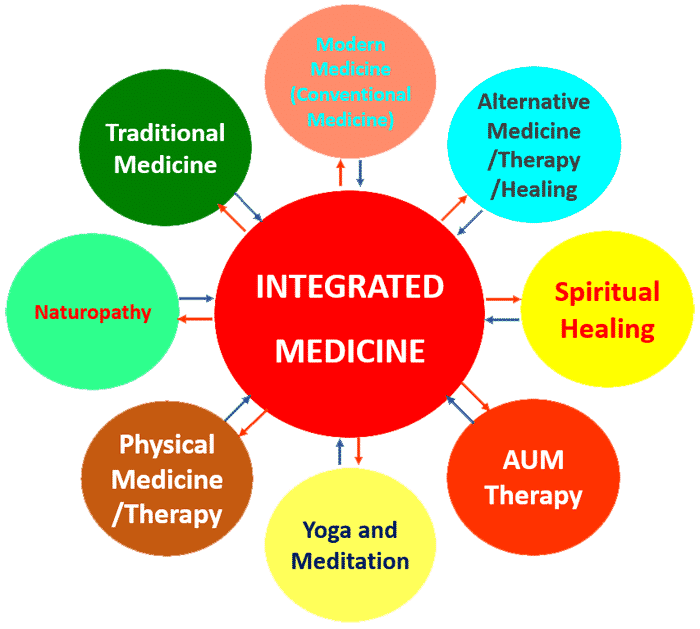
Yes, you can find practitioners specializing in integrative medicine, who combine conventional and complementary therapies. Look for licensed integrative or functional medicine practitioners for comprehensive care.
It’s, therefore, essential that one finds the right practitioner for an integrative approach to allow for optimal treatment. At this juncture, you may want to check if they are certified in integrative medicine or if they received special training in the same.
Ensure that their credentials are verified by professional organizations like the Integrative Medicine Consortium or the American Board of Integrative Medicine. Also, you may want to consult your primary care physician or friends who have undergone similar treatments.
Ask potential physicians about their conventional and other therapy experiences, patient care approaches and how they remain up-to-date with research issues when interviewing them. Consider asking about their philosophy on treatment and whether they work together with other healthcare professionals. Ask yourself if you like their communication style and if they are willing to listen to your healthcare concerns. To achieve the best results possible, make sure that you choose a qualified integrative practitioner who meets all of your needs.
What Is The Future of Integrative Medicine?
The future of integrative medicine likely includes expanded research, greater integration with conventional care, and increased personalization, focusing on holistic and evidence-based approaches.
As the world changes, so does the future of integrative medicine, which presents an interesting possibility for growth in the healthcare industry. With the growing acknowledgment of holistic benefits, there will be more mainstreaming of integrative medicine through the incorporation of high-tech tools and personalized medications.
The main objective will be to combine traditional medical practices with complementary therapies thereby giving an all-inclusive solution to health problems. However, challenges exist, including the need for a more stringent scientific validation process verifying alternative treatment methods while harmonizing them into conventional ones. Opportunities lie in enhancing education programs for medical practitioners, promoting patient-centered approaches to health care services, and collaborative care models within hospitals across various disciplines.
This type of alternative treatment is expected to undermine existing models and healthcare systems by offering superior treatment modalities that work towards engaging patients more than conventional medicine does, resulting in an improvement in patient care and satisfaction. All this type of alternative treatment also become useful in the fact that it cannot be limited to one way of incorporation into the already existing structure of conventional medicine discussed in the forward, but will aid in enhancing the patient’s health status.
Conclusion
In integrated medicine, the health aspect that encompasses the physical, psychological, and spiritual aspects of human beings can be provided by the use of both orthodox medicine and complementary alternative medicine. It is a well-grounded way of attaining health that targets the whole being rather than the selective parts of the being.
In this case, especially with respect to conventional therapies, there is so much to be gained by treating integrated alternative medicine as a supportive device thus informed consent provision is crucial and every patient should be made aware of the steps to come before the commencement of the procedure. Thus, this means seeking permission in the first place from the physician would be the most feasible and effective action to take to stock these two aspects.
References
Integrative Medicine
Innovative medicine is transforming healthcare by combining the top elements of conventional healthcare with effective complementary treatments that are supported by evidence.

Innovative medicine is changing health care as it combines the best parts of conventional health care with proven complementary treatments that are evidence-based. This approach is focused on the body, mind, and spirit as a whole person by being proactive in the prevention of health concerns and active management. It values the participation of patients and employs a variety of therapies for better health optimization.
Let’s explore integrative medicine in its profundity, showing how it can boost your journey to wellness, help you to manage chronic illnesses, and enhance the quality of life by an individualized approach towards wellness. Come with us on this journey that can change lives; Integrative Medicine.
What is Integrative Medicine?
Integrative medicine is a healing-oriented practice that considers the whole person (body, mind, and spirit), including all aspects of lifestyle, it emphasizes therapeutic relationships and utilizes all appropriate therapies whether they are considered to be conventional or alternative. The goal is not only treating diseases but also attaining and maintaining optimum health.
Fundamental Concepts and Techniques of Integrative Medicine
Key Principles of Integrative Medicine
Patient-Centered Care: The core principle behind integrative medicine is that all patients should receive personalized care based on their needs accordingly this approach practices patients as partners in the treatment decision-making process.
Evidence-Informed Therapies: Although integrative medicine may include alternate therapies, alternate therapies must undergo rigorous safety testing together with efficacy determination. This means best available scientific evidence should be combined with clinical expertise plus patient values.
Health Promotion and Disease Prevention Focus: Preventive measures have been favored in such a way that health would come instead of just waiting for illness to knock in within the integrative healthcare system. Healthy lifestyle practices, such as nutrition and stress management, among others, are being maintained in order to gain health.
Key Components of Integrative Medicine
Standard Medical Methods: This can include drugs, surgery and other western techniques. They are “standard” when used alone or in tandem with other treatments as part of a complete plan for well-being.
Complementary Approaches to Health: This term encompasses an array of practices that typically fall outside what is considered conventional medicine. Examples include herbal medicine, yoga, acupuncture, naturopathy and chiropractic care among others.
Interventions Based on Lifestyle Choices: An important area within integrative medicine involves making changes in lifestyle choices, nutritional counseling, fitness plans, and stress reduction strategies all form part of this approach to treatment.
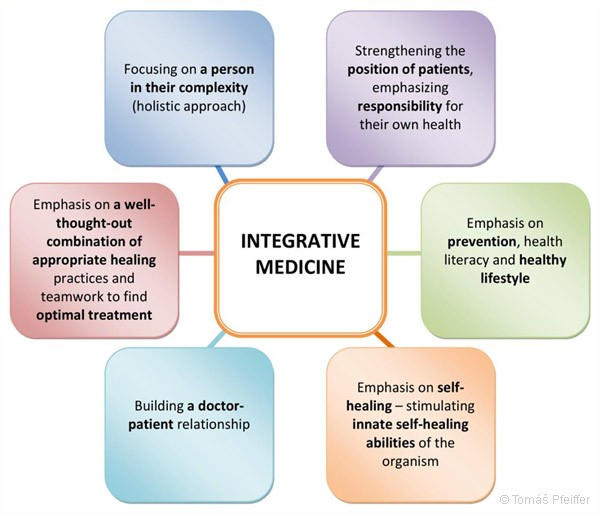
Healing Benefits of Integrative Medicine
Integrative medicine has a lot to offer in terms of physical, mental, and preventive health. By combining conventional medical practices with complementary therapies patients often achieve more holistic health improvements.
Improvements in Physical Health
Chronic Disease Management:
Integrative medicine has a bright future in managing chronic diseases like diabetes and hypertension. Patients can control their condition more effectively through combination therapy involving drugs and lifestyle changes. For example, diet alteration coupled with stress management may have significant impacts on blood sugar levels (BSLs) and blood pressure (BP).
Pain Management:
The problem with traditional pain management is that it relies heavily on medication which could lead to drug dependency or side effects. However, additional methods are available within an integrated framework such as massage therapy, yoga exercises, or acupuncture all aimed at lowering pain levels while improving quality of life. Scientific research has shown that among other illnesses chronic backache and arthritis respond quite well to treatment using acupuncture needles.
Improvements to Mental Health:
Methods of Relieving Stress:
Holistic medicine suggests that people should employ alternative methods like mindfulness meditation in order to control stress and anxiety. Continuous practice may also cut down on the frequency and intensity of diseases caused by stressful conditions.
Anxiety and Depression Treatment:
Alongside counseling sessions and drugs, there can be a more comprehensive approach toward mental wellness through complementary therapies such as herbal remedies, physical exercises, or nutritional changes.
Preventive Healthcare:
Recommendations About Dieting:
You will frequently find that integrative practitioners are very enthusiastic about nutrition when it comes to being healthy. Tailor-made dietary plans not only avert deficiencies in nutrients but also promote general healthiness while keeping sickness away.
Physical Fitness plus Activity Schemes:
Programs for working out are typically personalized so as to address unique health requirements thereby fostering long-term advantages for well-being.
Routine Checkups Plus Evaluations:
By placing an emphasis on prevention , this aspect of integrative medicine helps in identifying potential problems with one’s health before they become severe.
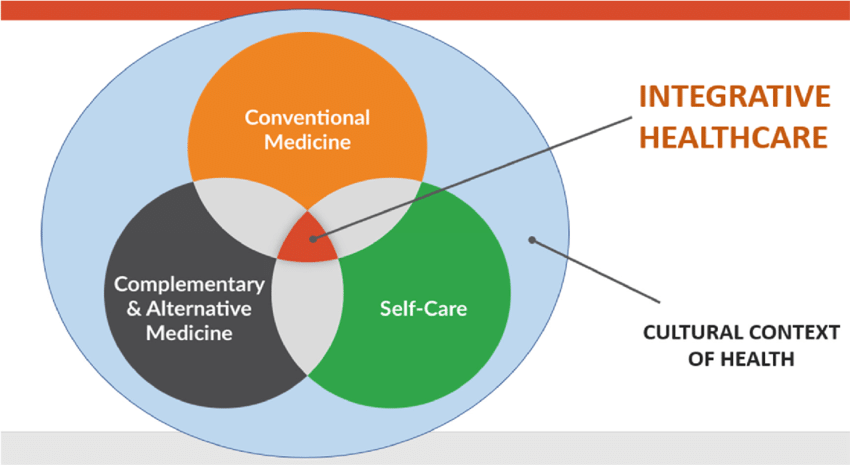
Exploring the Historical Roots of Integrative Medicine
Integrative medicine is derived from the ancient healing arts. Ayurveda and Traditional Chinese Medicine formed the two bases upon which it evolved with the integration of holistic practices with modern medical science. Natural remedies, herbs, and spiritual practices formed the practice that early civilizations advocated for the promotion of health and wellness. To this date, integrative medicine has transformed into a holistic treatment that incorporates mind, body, and spirit. It uses the best of both worlds employ evidence-based methods with alternative therapies to treat patients holistically.
Research Insights: Findings on Integrative Medicine’s Benefits
Promising is the development of integrative medicine through scientific research. The studies reflect a larger number of improved patients when treated conventionally and in conjunction with alternative treatments. This combination has worked well with patients requiring pain management and anxiety illness.
The studies show that the traditional methods can be complemented by acupuncture, yoga, and herbal practices, which provide alternatives non-invasive in nature for patients. Nevertheless, more large, controlled studies are needed to come to any benefits of a longer duration. The growing interest in evidence-based integrative approaches will increasingly make it a mainstream health choice over time.
Debunking Myths and Misconceptions About Integrative Medicine
Indeed, many misconceptions have been associated with integrative medicine. For example, some people claim that it is not science-based medicine, whereas in fact many integrative practices have research behind them. Another misconception is that it could really substitute conventional treatments; instead, integrative medicine should complement conventional treatments.
Some people believe that integrative medicine is not regulated; however, many practitioners gain certification and formal training. Such an approach also holds the fallacy of only natural treatments being trusted; herbal medication may also be hazardous when applied improperly. Only through education can it reach the heart of that claim.
Finding a Qualified Integrative Medicine Practitioner
The selection of the best integrative medicine practitioner requires researching. First, check if they are certified by a respectable institution. Check on the years the doctor has practiced conventional and alternative treatment. A good practitioner, though holistic in approach, should respect evidence. Look for reviews or ask for recommendations and feel comfortable discussing your health goals with them. This way, you get tailored and balanced care from a practitioner with your values.

Risks and Precautions of Integrative Medicine
Like all medical treatments, integrative medicine comes with some inherent risk. Herbal remedies can interact with prescribed medication in ways that cause the opposite effect of the desired effect. Poorly performed acupuncture or chiropractic adjustments can be dangerous. Let all of your providers know what therapies you are receiving. Only see certified practitioners, which reduces the risk. Taking care and being open with your healthcare team will lead to a safe balanced approach towards integrative medicine.
Practicing Integrative Medicine: Healing at Home Basics
Integrative medicine can be brought to home by the creation of a healing environment. Starting with simple habits such as meditation, yoga, or aromatherapy is a good starting point. Bringing in herbal remedies, proper nutrition, and stress-reduction techniques maximizes your overall well-being.
For instance, design of a serene, clutter-free space also encourages relaxation and mindfulness. The basis is quite simple-an approach to health that incorporates both emotional and mental needs in addition to physical wellness. Along with this, proper self-care practices maintain balance at home. Keeping abreast of the safety measures that are recommended in integrative practices can help you safely apply them at home. Seeking advice from professionals can also further buttress your efforts to heal at home.
Transform Your Life: Personal Growth through Integrative Medicine
The incorporation of personal growth occurs in integrative medicine through the mind, body, and spirit. It trains a person to become an active and effective agent in maintaining their health by establishing lifestyle changes such as mindfulness, exercise, and diet improvement. Emotional and physical transformation can be achieved through embracing therapies like acupuncture, massage, and meditation. Integrative medicine helps create self-awareness and balances emotions to acquire mental clarity and coping skills.
It gradually becomes established over time as based on learning and developing a healthier appreciation for higher wellness, strength, relaxation, and all-around better well-being in life. Integrative medicine can change your life through thoughtful sustainable changes.
The Challenges and Controversies of Integrative Medicine Today
While integrative medicine has very many positive points, controversy and criticism still fill the air. Critics have argued that some alternative therapies do not gain enough scientific proof. Other critics have also expressed concerns over the regulation of the practices of integrative medicine where by some treatments are administered without due oversight.
Patients may also be at risk of abandoning conventional medicine for unproven techniques. Evidence-based practices should be balanced with holistic approaches. People argue that integrative medicine should be used to complement, not replace, traditional treatments and more research is being undertaken to establish it within healthcare.
Cost: Investment in Treatment Interventions
The cost of integrative care differs depending on the treatment and health care practitioner. Most of them are not part of an insurance plan, and many people pay out-of-pocket. A Functional Nurse Specialist may receive education beyond that of a general nurse, which would drive the price up significantly.
Patients often feel that this investment will last for a long time. While integrative medicine is relatively pricey, the gains often justify the cost. You may be able to save money by concentrating your efforts first on treatments that actually help your health and seeking out practitioners who can provide flexible payment plans or sliding scale fees.
Becoming a Practitioner: Your Route to Integrative Medicine
An individual, in order to become an integrative medicine practitioner, requires training from conventional as well as alternative healthcare sources. Train in the mainstream healthcare professions and complement it by gaining certification in complementary therapies such as acupuncture, herbalism, or massage therapy.
Professional associations and practicing workshops to learn the practice of integrative approaches may also be added in one’s skills. After all, apart from training, there must be a holistic and all-inclusive approach in terms of physical, mental, as well as emotional health in the case of the patient. A certification in integrative medicine practice lets you share your holistic health approach with patients in order to achieve the highest quality of living and empowers you to impact successfully.
Connecting Others: Community Building in Integrative Medicine
Building a community in integrative medicine can be a very rewarding and empowering endeavor. Connecting with other people interested in healthy living allows you to share knowledge and work together as you heal. This connection will find you by joining wellness groups within your community, online forums, or social media communities where you learn from other practitioners and like-minded people.
Engage more with the integrative practices through getting involved in community activities, such as wellness retreats and workshops. A supportive network does not just encourage you but also keeps your journey to good personal health and well-being going and motivated.
Wrapping Up!
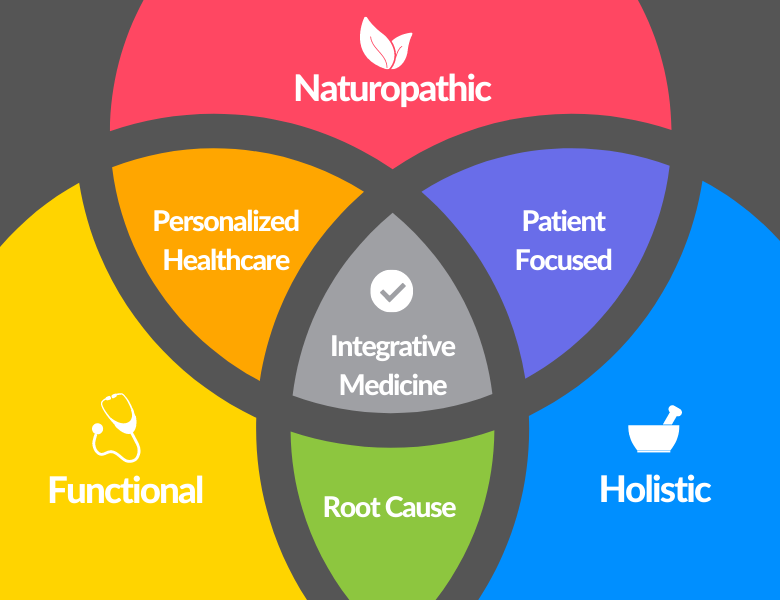
Integrative medicine is a promising approach toward better health through prevention, individualized care, and use of multiple treatments which have been proven to work through research. It treats all factors that constitute our well-being while considering us as the whole rather than parts alone; the form ensures an all-round approach toward wellness that no other can even achieve.
